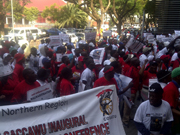Walmart on the ropes at hearing on its proposed buy of Massmart

At hearings in front of the South African Competition Tribunal, witnesses for Massmart and Walmart refused to make any commitments on local sourcing or maintaining union recognition after their merger deal goes through.
As the hearings started on Monday, Massmart CEO Grant Pattison was the first to take the stand. Pattison would not make any commitment that the deal would not reduce trade union rights. He said that retrenched workers may be rehired after the deal goes through but they will not be brought back on their previous terms and conditions.
When the Tribunal posed a hypothetical 5 year condition of maintaining locally sourced goods, Pattison immediately rejected any restrictions on the supply chain as “utterly unworkable” and was unflinching in his opposition to any conditions.
After Pattison, former Walmart Vice President Andy Bond took the stand to testify on behalf of the world’s largest company. Bond, a former chief executive of the UK’s ASDA after it was bought by Walmart, denied any detailed knowledge about Walmart in the United States.
Bond admitted that a Canadian store where workers successfully won union representation was closed because of higher wages that were negotiated once workers had a union. The store was the only unionised Walmart store at that time.
Bond also revealed that in discussions before Walmart made its official offer the company was concerned about when Massmart’s collective bargaining agreements would expire.
Under cross examination Bond said that Walmart’s global sourcing increased in 2010. Walmart uses global sourcing— ie searching the globe for the lowest price for its wares-- in every region where it has operations.
“We are very concerned about the effect this merger will have on workers in South Africa,” said UNI General Secretary Philip Jennings. “Walmart has a history of anti-union behaviour in its stores. And by putting constant pressure on suppliers to cut the costs of their goods and the time it takes to deliver them, many manufacturers have cut pay and standards to meet the company’s demands.”
A global coalition of unions contesting the merger – South Africa Commercial, Catering and Allied Workers Union (SACCAWU), UNI Global Union, and the United Food and Commercial Workers International Union (UFCW) of North America— are presenting evidence showing that the Tribunal should only allow the deal to go through if Walmart agrees to conditions on treatment of workers, union rights and sourcing products locally.
The South African Government has also pressed for imposing conditions on the merger to protect the New Growth Path plan for the country’s economic development.

